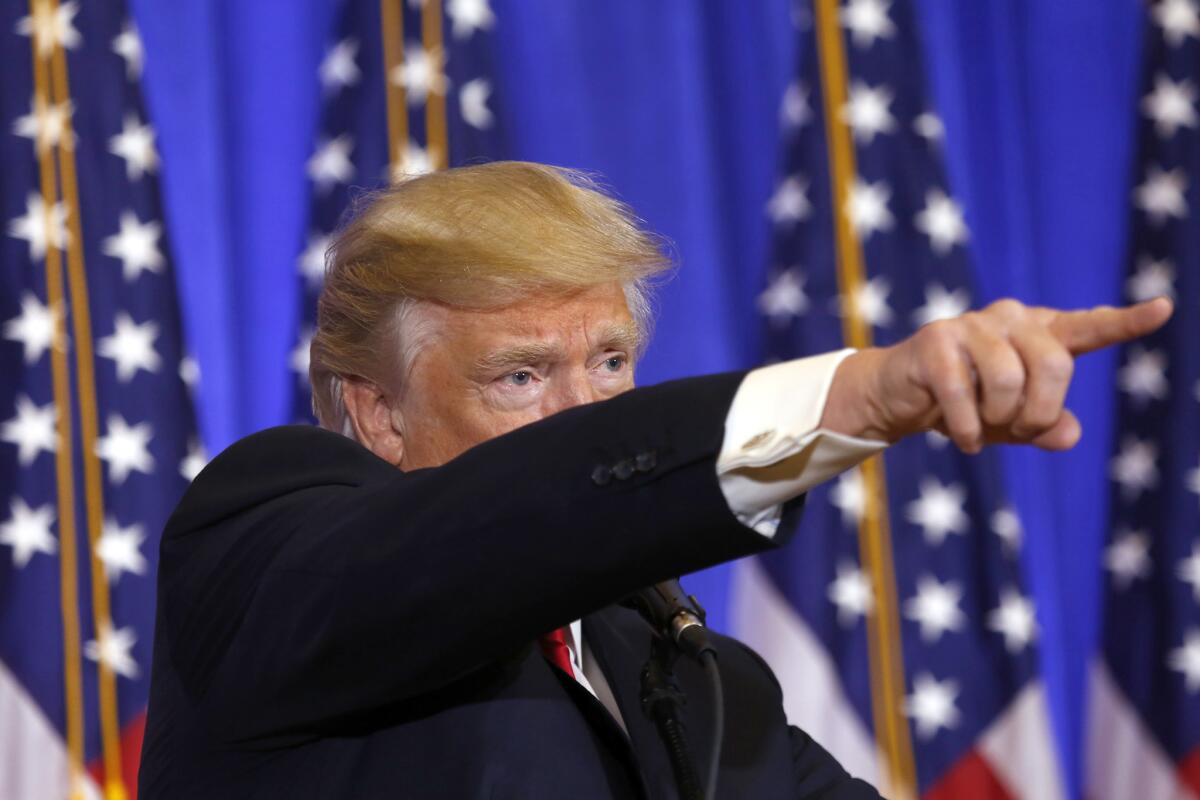Trump’s boldest campaign promises are getting a reality check

- Share via
Reporting from Washington — During his campaign, Donald Trump repeatedly promised voters a “big, beautiful wall,” an Obamacare replacement “immediately” and a new era for a Veterans Affairs agency that had “failed” service members.
He acknowledged Wednesday that none of it would be so simple.
Trump, who was often content to gloss over details while campaigning, is quickly grappling with the complexities of governing. Though Republicans will have majorities in the House and Senate and control of the White House for the first time in 10 years, fissures have begun to emerge on how to deliver on their campaign promises.
Repealing the Affordable Care Act, a Trump priority and the animating force within the GOP since the law passed six years ago, has run into roadblocks since Congress convened last week. The debate centers on whether to repeal immediately without a replacement plan, which would leave millions of Americans without healthcare.
Trump said he would produce his own plan as soon as his Health and Human Services secretary takes office — something that could take weeks — just one day after demanding that Republicans both repeal and replace the health law as soon as next week. He promised that both parts would happen together.
“It’ll be repeal and replace. It will be essentially simultaneously,” he said, calling such a move “very complicated stuff.”
Republican leaders have considered a more staggered approach where they would pass repeal legislation now that would allow them as much as two years and perhaps more time to develop a replacement.
“We need to do this right. We need to make sure there is a stable transition period so that people do not have the rug pulled out from under them,” House Speaker Paul D. Ryan (R-Wis.) said. “This is how we will keep our promise.”
The strategy is already in jeopardy. Resistance is growing among Republicans to take a first step toward repeal, approving a procedural budget package. The move had been expected later this week, but some lawmakers are worried that it will set a repeal in place before an alternative is ready. A preliminary whip count showed the budget vote was in trouble.
“You can’t repeal it and replace it quickly. That’s an oxymoron,” said Rep. Chris Collins (R-N.Y.), one of the earliest Trump backers in Congress. “He wants us moving it through so we can put it on his desk right away.”
Trump once again offered no details about what his plan might look like, other than promising to produce something “far less expensive and far better” than the current law. As importantly, Trump provided no indication of how he plans to get support from congressional Democrats, who will be needed to pass any replacement to Obamacare.
He said simply that the repeal and replacement would probably happen “on the same day.” It “could be the same hour.”
And after months in which he blasted the Obama administration for mismanagement at the Department of Veterans Affairs, his opening remarks included a surprise announcement: David Shulkin, a VA undersecretary, is his choice to lead the department.
The selection came as a shock to veterans groups and represented a considerable setback to the network of nonprofits funded by billionaire industrialists Charles and David Koch. Trump had earlier left the impression he would be cleaning house at the department to implement a free-market approach favored by the Koch organizations that could shift a considerable amount of the care provided by VA facilities over to the private sector.
Shulkin has been an outspoken critic of such an approach, making him a favorite target of the Koch-funded nonprofit Concerned Veterans for America. In a blog post in April, the group characterized Shulkin’s performance taking questions from a congressional committee as a “show of incompetence” and reflective of “what’s wrong with the VA.”
But Trump, who embraced much of the Koch-backed organization’s reform plan during the campaign, passed over contenders for the VA post who favored the blueprint championed by Concerned Veterans for America.
Trump appears to have balked amid warnings from mainstream veterans groups representing millions of former soldiers against abandoning the reforms implemented by the Obama administration in favor of an approach more oriented toward privatization.
And on the border wall, Trump reminisced about the call-and-response at his rallies of “Who’s gonna pay for it?” “Mexico!” But he backed off of his pledge that he would demand Mexico pay for the wall right away, saying he was impatient to begin construction but that talks with Mexico might take longer.
“I want to get the wall started,” he said. “I don’t want to wait a year and a half until I make my deal with Mexico. And we probably will have a deal sooner than that.”
Trump’s dilemma is not uncommon for presidents-elect, said Martha Kumar, director of the White House Transition Project.
“In a campaign, it’s black and white: Your proposals are good and the other guy’s aren’t. And you lay out things that really aren’t practical,” she said. “Is it better to just stick with what you said during the campaign, or is it better as you learn more to make changes?”
The challenge can be more pronounced for someone with as little governing experience as Trump.
“You have to make compromises. It’s the only way you do it,” Kumar said.
Twitter: @mikememoli
Twitter: @lisamascaro
Times staff writers Noam N. Levey and Evan Halper contributed to this report.
What Trump made clear at his news conference and what he left murky
Democrats and their allies won’t let Obamacare go down without a fight
Donald Trump’s newest branding endeavor: the economy
More to Read
Sign up for Essential California
The most important California stories and recommendations in your inbox every morning.
You may occasionally receive promotional content from the Los Angeles Times.












